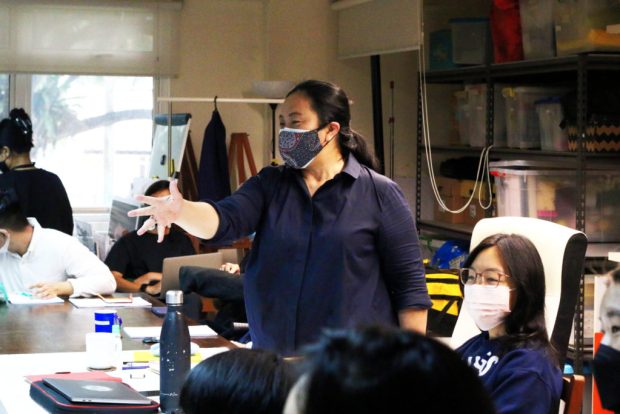The acclaimed playwright at Checkpoint Theatre gets honest about adulthood and becoming a parent in her latest play, “The Fourth Trimester”.
“What is The Fourth Trimester about? That’s a very good question. It’s definitely about parenthood; that’s the simplest way to put it. It really examines the new identities that you come into when you have a child.
The fourth trimester refers to the 12-week period after you’ve had your baby. And I named the play that because when you first become a parent, it’s a transitional period where you kind of shed your past selves and find a way to just learn to swim in the dark.
You learn to become accustomed to this new life not only with your child, but also with your partner. Because the fact is, you and your partner’s relationship will never be the same again. And your relationship with yourself will never be the same again.
There were a bunch of things that inspired me to write The Fourth Trimester. One is obviously that I am a parent. So when I gave birth to my son, I think I wasn’t prepared for how emotionally tough it would be.

I did take prenatal classes. I also talked to friends who had already given birth, but I wasn’t prepared for how traumatic it would be, just in terms of what it was doing to my body. It was all so frightening and unpredictable.
And overnight, the way in which people related to me changed. I’m no longer my own person. My identity was tethered to my son. I remember my in-laws coming over and the first thing they asked was, ‘Where is the baby?’ and ‘How is the baby doing?’

For some reason, when people see a new mum for the first time, they don’t actually ask her how she is, or how the labour process was for her. They kind of expect that she will just deal with it. So I think that was a tough shift for me, mentally.
The Fourth Trimester is also about adulthood. Because I’m in my thirties, I realised that the conversations I was having with my friends always circled around the same things: their life partner – or lack of a life partner – and their parents pressuring them to have a child.

And when they’ve had their first child, there’s pressure to have a second. So you can’t win lah, basically. They’d also talk about not being happy with their jobs, or being happy with their jobs, but being unhappy with the pay or their colleagues.
So it always comes back to the same question of ‘Are you happy?’ And what does it even mean to be happy? Does it even matter? Because it’s really hard to be happy in Singapore. There are so many expectations and it’s all very heartbreaking.

By a certain age, you should already be in a certain tier of your career, you should already be married, you should already have children, and your children should have gone to these schools, and your partner should be this kind of person who treats you a certain way.
There comes a point where you stop running away or stop moving so quickly through your life, and you just take stock of whatever that’s happened and ask yourself, ‘Is this where I really want to go?’ And if it isn’t, what changes can you make in your life to be happy?

It took me about 30 drafts and two years to finish writing this play. It was very healing for me because at Checkpoint Theatre – particularly with Claire Wong as the play’s director – the message I was getting is that no matter what you say or do, we will accept you as you are.
And knowing that I wouldn’t be judged gave me a lot of courage to really go places that I wouldn’t have gone, or to cover issues that I wouldn’t have dared. Checkpoint Theatre is a safe space for me to be really vulnerable. I had no filter. I was as raw as you can get.

Writing this play was also healing because during the COVID-19 confinement period, you are so much in your own head. You lose touch with reality and society. You don’t function like an adult because everything revolves around being a parent to your child who is stuck with you at home 24/7.
I think everybody needs to have that sense of pride in whatever work they do. And I think for me, it has to be for a purpose that is bigger than me. Then I’ll feel like there’s meaning to what I’m doing. My sense of self-worth is not just tied to being a parent.

I want to show my son that I am leading a life that is fulfilling and meaningful, and that I’m impacting the community. I must seek my own happiness so that when he looks at me, he will think, ‘Oh, that’s how mum looks when she’s happy, and that’s how I can aspire to be happy, too.’” – Faith Ng
Interview by: Arman Shah



Leave a Reply